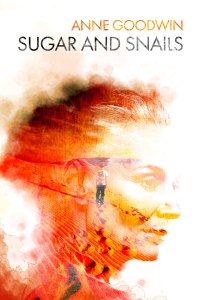I have been friends with Anne Goodwin who blogs at Annecdotal for almost as long as I have been blogging. While there are many differences in our experiences, there is the right balance of agreement and divergence for friendly and robust discussion to occur. Anne regularly contributes to the conversations on my blog through her thoughtful comments.
Anne has also visited as a guest blogger twice before. The first was a discussion of The Examined Life by Stephen Grosz. In the second she wrote about the treatment of friendship in her debut novel Sugar and Snails. This post celebrates that novel’s first birthday! Congratulations, Anne. I wish you much success with this and future writing.

In this post, Anne discusses the legacy of a Catholic childhood. I hope you will join me in welcoming Anne to my blog.
The legacy of a Catholic childhood
It was our last evening in Rome, and we’d grown weary of churches, even when they hosted a Caravaggio painting or a Bellini sculpture. But it seemed a shame to leave without a peek inside the church we’d passed almost every day that week on the way to some museum or other attraction. So while my husband walked back to our rented apartment for a pre-dinner cocktail, I pushed through the heavy door.
Just inside, I hesitated. I hadn’t expected there’d be a service in progress. I was mesmerised: the golden light; the scent of incense, the mournful melody of human voices accompanied by an organ. I registered this, not so much with my eyes and nose and ears, but in my gut. In another country, in a less magnificent church, this had been my childhood.
Ignoring the disapproving gaze of the usher, I passed through the rope barrier holding back the tourists, to take my place among the congregation. I no longer shared their faith, but I felt entitled to share the ritual.
My childhood, at Catholic schools, was passed within a bubble. It was something of a culture-shock to discover, at university, that the majority of people I encountered belonged to other religions, or none. Later still, more at ease in the secular world, it was always interesting when friends and colleagues outed themselves as former Catholics. Then there’d be that nod of recognition, a shared heritage marking our psyche more indelibly than the ashen cross the priest would thumb on our foreheads at the beginning of Lent.
I believe that we are strongly shaped by the past, so what is the legacy of a Catholic childhood? Some have found solace in the beauty of the liturgy and the sense of community while others have had their personalities destroyed through unimpeded clerical abuse. Many, like me, would place themselves somewhere in the middle, regarding Catholicism not as something to celebrate but to recover from.
The threat of eternal damnation incites fear, or disbelief, and neither is conducive to developing a person’s moral compass. Telling a child what she must believe, rather than letting her discover it, doesn’t facilitate an enquiring mind. While it might seem comforting to be able to believe there’s a God who will always take care of you, you’ve a more secure base if you’ve been brought up by parents who are responsive to your earthly needs. There seems to be a very fine line between putting your faith in magical solutions and the “delusions” of the psychotic mind. And the veneration of suffering and a tortuous death through crucifixion is decidedly odd. As for sex, the risky business of discovering a new kind of intimacy in adolescence is further distorted by the taint of shame.

When it came to writing my debut novel, Sugar and Snails, it made sense to give my main character a Catholic childhood. Uncomfortable in her skin from childhood, Diana finds no salvation in the church. She recalls morbid childhood games and, aged about eleven, being taken on pilgrimage to Lourdes for a miracle cure for a problem no-one will name. As an adolescent in the 1970s, her knowledge of menstruation comes from the bizarre instruction manual, My Dear Daughter, an exercise in obfuscation of North-Korean proportions, which her mother surreptitiously places on her bed along with a packet of bulky sanitary towels. Although it would be unfair to blame it entirely on Catholicism, she doesn’t have sex until the age of twenty-five and then it’s so dreadful she is celibate for the next twenty years.
Yet I didn’t want to stuff my novel with my own issues. Firstly, because I don’t think that makes for a good read; secondly, I didn’t want to alienate potential readers, especially not the old school friends to whom my novel is partly dedicated, most of whom have stayed loyal to their childhood beliefs. Fortunately, my novel’s first year of feedback suggests I’ve managed on both counts.
In preparing this post, I realised that less than half the Catholic scenes from earlier drafts survived to the final version. While there are solid structural reasons for these deletions, it also strikes me that, in the almost seven years I’ve been writing this novel, I’ve become less angry about the past. Perhaps it’s because I’ve worked through it or maybe simply because, as in that church in Rome, I’ve been able to reclaim the good bits. No, I don’t go to church, but I do sing with a marvellous mixed-voice choir. While we have an eclectic repertoire, it’s the sacred works – Verdi’s Requiem, Handel’s Messiah and the like – that really make me tingle inside. For more on the music that shaped my novel, see my forthcoming post on the undercover soundtrack.

Please check out some other stops and posts on the Birthday Blog Tour.
Anne Goodwin’s debut novel, Sugar and Snails, about a woman who has kept her past identity a secret for thirty years, was published in July 2015 by Inspired Quill and longlisted for the 2016 Polari First Book Prize. Her second novel, Underneath, about a man who keeps a woman captive in his cellar, is scheduled for publication in May 2017. Anne is also a book blogger and author of over 60 published short stories. Catch up with Anne on her website: annethology or on Twitter @Annecdotist.
In honour of its first birthday, Sugar and Snails is available in Kindle format at only £0.99 / $0.99 until 31 July 2016.

Thank you for reading. I appreciate your feedback. Please share your thoughts.



Pingback: School Days, Reminiscences of Anne Goodwin | Norah Colvin
Pingback: Struggling soprano no more? | Dr Gulara Vincent
Great guest post, Anne (and thank you for hosting, Norah)! Such a fascinating topic, in regards to how much to put of oneself into one’s book. As for Catholicism, I had the odd upbringing of being unbaptized in a Catholic family, thus denied the rituals. I remain to this day interested because it was always such a mystery and one I was denied. In a reverse way, perhaps I’m recovering, too. At least I found my own path elsewhere. I really respect that you find joy in choir music and lend your voice to that pursuit. Having read your book, I think you did a fine job of bringing your protagonist’s upbringing to light in a compassionate way.
LikeLiked by 1 person
Thanks, Charli, I think we’ve mentioned before our almost opposite experiences of Catholicism and I can appreciate your sense of exclusion – I think the church is rather good at making people feel they don’t fit.
LikeLiked by 1 person
Congrats, again, on your novel’s first birthday, Anne. 🙂 Love that fact that you’re doing a celebratory tour. And nice to see you at Norah’s place.
A couple lines really struck me: “regarding Catholicism not as something to celebrate but to recover from.” Powerful. Also, I find it very interesting that “in the almost seven years I’ve been writing this novel, I’ve become less angry about the past.”
Great guest post.
LikeLiked by 2 people
Thanks, Sarah, very nice to be here. Regarding my anger, it’s probably down to years of therapy – but I had to get angrier first before I could let some of it go.
LikeLiked by 2 people
I kind of know that feeling. *ahem* 😉
LikeLiked by 2 people
Hi Norah (in the US?) this feedback is for Anne rather than you. I am always sad when I read of childhood memories scarred by interactions with ‘religion’, I shouldn’t add especially the Catholic Church. I didn’t share this past but despite an Anglican Church upbringing it was as an adult that I became a follower of Christ and the joy this brings as opposed to the restrictions and rules so often ‘taught’. I’m glad Anne gets a tingle from singing sacred music, long may this last. I have my kindle copy of Sugar and Snails and look foreward to its ‘one day’ place in my reading pile. Congrats Anne on the anniversary.
LikeLiked by 2 people
Thank you, Rosemary, for sharing your thoughts and congratulations for Anne. It’s a great achievement.
LikeLiked by 1 person
Thanks for your contribution, Rosemary, and good that you found religion your own way! Thanks for downloading Sugar and Snails and hope you can find the time for it soon.
LikeLiked by 1 person
Hello Norah – I’ve popped back in after an absence and so delighted to read this post! You are a very generous person! I share some blogs I follow with Anne, I know her name, but have never read her blog. Isn’t that dreadful! Her book sounds right up my alley [and the next one will also be a fascinating read too I’m sure]. I’m a bit sporadic on the www at the moment, but shall pop over for a visit.
Happy book birthday Anne! If I had a kindle I’d download immediately! 🙂
LikeLiked by 2 people
It’s lovely to see you again, Pauline. I have missed you. Thanks for stopping by.
I really enjoyed “Sugar and Snails” and am looking forward to “Underneath” too. I downloaded the Kindle app on both my iPad and phone, so can now read wherever I am. I should do it more often! 🙂
LikeLiked by 1 person
Thanks for your support, as ever, Norah.
LikeLiked by 1 person
Thanks, Pauline, I think it’s a great thing about blogs how we can connect through an intermediary. But there’s so much in the blogosphere it can be hard to get to know each other on our personal blogs. You’re most welcome at mine if/when you find the time.
LikeLiked by 1 person
well, I know BOTH of you, so it is lovely to read this piece. I had a Jewish childhood…just as constraining and eclectic in its way as yours. I think it comes out in my writing in that I always have a ‘loner’ type heroine…I was the only Jewish girl in a school of 800. Never thought about it before…..
LikeLiked by 2 people
That’s interesting, Carol. Thank you for stopping by to catch up with Anne here. Although I am from a large family I always felt the “odd one out”. For that reason I am drawn to the loners in fiction also. I guess it’s true of how we perceive ourselves as well.
LikeLiked by 1 person
I do think it’s common among writers to feel like an outsider.
LikeLiked by 2 people
So I’m not alone? That’s funny! 🙂
LikeLiked by 1 person
Oh, interesting, Carol, as I Catholic, I was always confused how we seemed to both celebrate and condemn the Jews. Scapegoating as ever.
LikeLiked by 1 person
It seems there always has to be someone to pick on or blame.
LikeLiked by 1 person
I like this ‘blog tour’ idea. Very cool. Supporting other bloggers is important.
LikeLiked by 2 people
Thanks, Cindy. It is great idea. I enjoy supporting others bloggers. We are all in this together. 🙂
LikeLiked by 2 people
Thanks for hosting this, Norah, and for your friendship across the blogosphere. And who else would have taken the time to bake such a lovely virtual cake!
LikeLiked by 1 person
You are welcome, Anne. It’s always a pleasure to spend time with you. I’m pleased you enjoyed the cake. 🙂
LikeLiked by 1 person